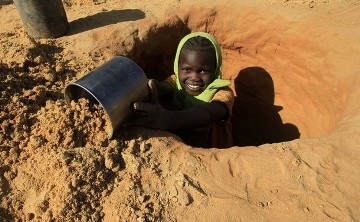Situation in Darfur’s Abu Shouk Camp deteriorating – report
February 12, 2012 (LONDON) – The humanitarian situation in Abu Shouk Camp, situated just outside al-Fasher in North Darfur is deteriorating according to a new report released by the Sudan Social Development Organisation (SUDO).

The UN says that 300,000 people have died and 2.5 million displaced by the conflict between rebels and the government and their paramilitaries. Khartoum says that these figures have been inflated for political reasons and put the death toll at around 10,000.
Humanitarian agencies have been providing assistance to displaced people since the conflict began in 2003. However many were thrown out of the country in 2009 after Sudanese President Omar Hassan al-Bashir was indicted for war crimes, crimes against humanity – and the next year genocide – in the western region by the International Criminal Court (ICC).
Some internally displaced people (IDPs) have been forced to work low-paid jobs in al-Fasher making them vulnerable to exploitation due to new policies by the World Food Programme (WFP), the report found.
Instead of receiving monthly provisions from WFP they are now being given 22 Sudanese pounds (just over $8) per month to buy goods from merchants, the reports says.
SUDO’s report found that WFP’s policy of providing money rather than direct aid has had the consequence of women and girls being sexually exploited as they are forced to work as maids, resulting in many illegitimate births.
Another factor forcing women and girls to seek poorly paid work in al-Fasher town was the closure of organisations that provided them with training and other assistance.
In 2009 SUDO was dissolved by Sudan’s Humanitarian Assistance Commission (HAC) and had to stop working in the camp. A court in Khartoum overruled the decision in 2010 but they are still in discussions with the security about their activities.
HEALTH SITUATION ‘BACK TO ZERO’
Only the Sudanese Red Crescent and the Arab Egyptian Center are providing health care in Abu Shouk Camp the report said, which is one of the biggest displaced camps in North Darfur with more than 80,000 people living there.
The lack of health centers has brought the situation situation ‘back to zero’ following a period when good health care was available, SUDO says.
INSECURITY
The activities of the police, security and central reserve police is having a ‘negative impact on the life of IDPs; who had originally come to the camp as refugees from the traumas and displacement suffered from attacks’.
Some IDPs are being arrested ‘simply for expressing their opinion about the government’ SUDO claims. The report also notes that many IDPs work for the security services, including many of the camp sheikhs [leaders].
The government perceives the camps as a security threat as many of the IDPs are seen as supporters of some of Darfur’s rebels groups.
According to the report:
activists and human rights defenders say they suffer continuously from human rights violations, prosecutions and arrests. For example Mohammed Ali Kanjir was arrested in the market in Abu Shouk on 25 December 2011 by security personnel and at the time of writing has not yet been released. Two women activists, Nafisa Mohammed Adam and Hawa Abdallah suffered human rights violations and prosecutions and were lately detained for more than one month; now they are in Cairo.
The SUDO report also accuses the government of co-opting and arming some IDPs, which meant that minor disputes can escalate into gun fights among the camp’s 30 blocks, which are inhabited mostly by the Fur, Tunjur, Berti, Zaghawa, Gimer, Fellata and Hawara ethnic groups.
The legal situation of IDPs has also decreased, the report found, as the organisations that had provided services were closed down by the government in 2009. Conflict resolution and access to justice for victims of serious crimes, including rape, has been negatively impacted by the closures, the report found.
(ST)
